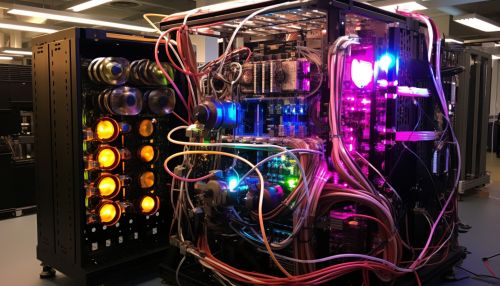The Role of Quantum Computing in Data Analysis and Machine Learning
Introduction
Quantum computing is a rapidly evolving field that leverages the principles of quantum mechanics to process information. Unlike classical computers, which use bits as their smallest unit of data, quantum computers use quantum bits, or qubits, which can exist in multiple states at once due to a property known as superposition. This allows quantum computers to perform complex calculations at a speed that is exponentially faster than classical computers.


Quantum Computing and Data Analysis
Data analysis involves inspecting, cleaning, transforming, and modeling data to discover useful information, draw conclusions, and support decision-making. Traditional data analysis methods can be time-consuming and computationally intensive, especially when dealing with large volumes of data. Quantum computing offers a potential solution to these challenges, as it can process large amounts of data quickly and efficiently.
One of the key advantages of quantum computing in data analysis is its ability to perform parallel computations. Due to the principle of superposition, a qubit can represent multiple states simultaneously. This means that a quantum computer can perform many calculations at once, greatly speeding up data analysis tasks.
Another advantage is the ability of quantum computers to handle high-dimensional data. In many real-world scenarios, data can be multi-dimensional and complex. Quantum computers, with their ability to exist in multiple states at once, are naturally suited to handle such data.
Quantum Machine Learning
Quantum machine learning is a subfield of quantum computing that combines machine learning and quantum physics to improve the computational speed and performance of machine learning algorithms. Quantum machine learning algorithms can be used to analyze large datasets, identify patterns, and make predictions much faster than classical machine learning algorithms.
Quantum machine learning can be divided into two main categories: quantum-enhanced machine learning and quantum machine learning. Quantum-enhanced machine learning involves using quantum computers to speed up classical machine learning algorithms, while quantum machine learning involves developing new machine learning algorithms that leverage the unique properties of quantum systems.
Quantum Algorithms for Data Analysis and Machine Learning
Several quantum algorithms have been developed for data analysis and machine learning. These algorithms leverage the unique properties of quantum systems to perform tasks more efficiently than their classical counterparts.
One of the most well-known quantum algorithms is the Quantum Fourier Transform (QFT). The QFT is a quantum version of the classical Fourier transform, and it can be used to transform quantum states into a different basis, making it easier to analyze and manipulate the data. The QFT is a key component of many other quantum algorithms, including Shor's algorithm for factoring large numbers and the quantum phase estimation algorithm.
Another important quantum algorithm is the Quantum Support Vector Machine (QSVM). The QSVM is a quantum version of the classical support vector machine, a popular machine learning algorithm used for classification and regression tasks. The QSVM can be used to classify high-dimensional data more efficiently than the classical SVM.
Challenges and Future Directions
Despite the potential advantages of quantum computing in data analysis and machine learning, there are several challenges that need to be overcome. One of the main challenges is the issue of quantum decoherence, which occurs when a quantum system loses its quantum properties due to interactions with its environment. This can lead to errors in the computation, and it is a major obstacle to the development of practical quantum computers.
Another challenge is the lack of quantum software and algorithms. While several quantum algorithms have been developed, many more are needed to fully exploit the potential of quantum computers. In addition, these algorithms need to be implemented in quantum programming languages, which are still in their early stages of development.
Despite these challenges, the field of quantum computing is advancing rapidly, and it holds great promise for the future of data analysis and machine learning. As quantum computers become more powerful and accessible, they are expected to revolutionize many areas of science and technology, including data analysis and machine learning.
